It has become clear that the successive developments in the Middle East region imposed “urgent needs” on the countries of the Middle East. These were translated into intense consultations between the major countries in the region on the Palestinian issue, and the Gaza war came to highlight a rare moment of harmony between these countries regarding the rejection of the Israeli aggression against the Palestinians people, the need for a ceasefire, reconstruction, and the establishment of a Palestinian state. The developments in Gaza tested the solidity of the process of restoring Saudi-Iranian relations, and contributed to significantly strengthening the Egyptian-Turkish dialogue and coordination. Overall, the dialogue, consultation and coordination between Cairo, Ankara and Tehran, and the calmness of the situation between the Arab countries, especially the Gulf countries and both Türkiye and Iran, were notable.
There is no doubt that the temperature of Ankara and Tehran’s relations with the Arab countries strongly affects Egypt’s relationship with these two countries.
Cairo has worked to ensure that Turkish and Iranian influence among the Palestinian factions in the Gaza Strip contributes to advancing efforts to settle the two-state solution and blocking Israeli aggression. Cairo has sought, through its relationship with Tehran, Ankara, Qatar and Hamas, to continue peaceful efforts and conclude deals to exchange prisoners and end the war. Other countries tried to take advantage of Cairo’s openness to Washington to change the American position and convey messages to the Biden administration.
Given the state of good understanding and coordination between the three countries regarding Gaza so far, the Palestinian issue is a strong candidate for further coordination between the three countries on the path to reaching a two-state solution.
While the “Egyptian-Turkish dialogue” is proceeding quickly to prepare for an imminent new summit between Presidents Abdel Fattah El-Sisi and Recep Tayyip Erdogan, the dialogue between Cairo and Tehran is advancing calmly. The movements of the three capitals and their interaction with each other have received an in-depth look by experts, and institutes of political and strategic studies. Some went so far as to talk about a deep partnership between Egypt, Türkiye, and Iran through multiple formulas at a time when Israel and Washington are talking about an American-led alliance whose membership includes Arab countries and Israel, against Iran.
It is clear from the behavior of Cairo, Ankara, and Tehran in dealing with the events in Gaza, a desire to calm the region and prevent a major war from erupting that would undermine development efforts and broad cooperation plans between the countries of the region on the basis of “zero problems” and “win-win.”
I believe that the transformations in the region impose the need to reach deep understandings between these three countries, and to work to resolve many of the conflicts in the region by peaceful means, especially Syria, Lebanon, Libya, Sudan, and the Kurdish issue.And exploiting the power of these countries for the benefit of stability and the well-being of the peoples of the region. However, we must acknowledge that it is a “long journey” before reaching these understandings that would – if successful – change the course of the future in the Middle East, and Türkiye seems closer than Tehran to reaching understandings with Egypt and the Arab countries except Syria.
On the other hand, Tehran is pursuing the crisis of the occupation of the three islands with the UAE, its strong presence in Lebanon, Syria, Iraq and Yemen, and its support for Hamas and Jihad.
Perhaps it is possible to begin building bridges of understanding and a joint mechanism for resolving differences and conflicts in which Egypt plays an important role, due to Cairo’s great weight on the regional scene, the nature of its open approach, and the keenness of Ankara and Tehran to be close to it.
An agenda for the future
Informed Arab sources stated that we are witnessing the beginning of the “long march” towards new understandings in the Middle East. The beginning of the matter on the path to these “deep understandings” is the recognition of the power of the major powers in the region, and the recognition that they have vital national interests, and real concerns that affect their national security. There is a perspective that it is necessary to start from the ground of understanding to allay fears and achieve understandings not to threaten the national security of each country. For that, it needs to be clarified to the others what the “red lines” are. With regard to interests, “mutual gain” and everyone wins is a strong and practical rule.
At the same time, informed sources believe that the most important point in the concept of the new approach is that this understanding between Egypt, Türkiye, and Iran is not an “alliance” directed against others, nor a club that excludes or marginalizes other countries, or an umbrella for sharing influence. Rather, it is a vehicle for solving problems and achieving stability, and a partnership for exchanging benefits and achieving stability and well-being for the peoples of the three countries, and the door is open to whoever wants to participate and win.
Hence, experts point out that Cairo is keen to move calmly and naturally without being drawn into exaggerations in describing its relations with other countries. It is conducting consultations and coordination with Ankara and Tehran and is keen to dispel wild expectations and allay the fears of others regarding such a partnership.
Cairo insists on adopting dialogue and peaceful solutions, and calls on others, most notably Israel, to replace the approach based on ideology and violent conflict to a new model centered around vital interests and diplomacy.
Some foreign policy experts believe that the Gaza war, the role of Hezbollah and the Houthis, and then the Iranian attack on Israel demonstrated a reality that believes that the resistance alliance will not disappear, nor will it be simply removed, but rather continue.
Iran and its allies have demonstrated their ability to forcefully harm Israel, and proven that the entity of the occupation is unable to keep the war away from itself. What is more important is to prevent the occurrence and continuation of the war in its own arena, or to end any war with fast speed. Rather, it began to suffer greatly from long wars of attrition, which revealed areas of softness where it could be severely hurt, while the leaders of the Israeli security services concluded, in a meeting, that the war in Gaza “had reached a dead end,” according to the Israeli newspaper “Yedioth Ahronoth.”
At the same time, the war showed that the Arab countries must reach an understanding with Tehran on the basis that their conflict with Israel remains confined between them, and the Gulf does not want the fire to spread to its arena. The experience of Tehran’s attack on Israel showed that this can be achieved, but with difficulty, and fraught with risks. This point is one of the most important items on the agenda of consultations with Tehran, and is of interest to the Arab countries, especially the Gulf countries.
Israel’s panic
On the other hand, the Israeli media has become raving about Egyptian-Iranian coordination. Two days ago, the Israeli channel “I24” published a report on the relations between Egypt and Israel, and how the Israeli operation in Rafah provoked Egypt to the point of threatening Cairo to stop its mediation role, which caused a crisis in relations between Cairo and Tel Aviv.
The Israeli newspaper “Maariv” said that there is worrying cooperation between Iran and Egypt, as this is a threat that Israel has not yet witnessed.
For its part, the Israeli newspaper Yedioth Ahronoth spoke under the headline “Warning…Egypt and Iran are approaching under the guise of war in Gaza,” warning Tel Aviv of “the Egyptian-Iranian rapprochement that has reached advanced stages.”
Cairo adopts “strategic balance”
Egypt desperately needs strategic balance in light of the state of instability and international fluidity in the international system, and the return of competition between the major powers. Many experts believe that strategic balance can serve as a compass that guides Egypt in these ambiguous and turbulent situations. It becomes the interpretive framework for the positions adopted by Egyptian foreign policy before the countries of the world.
And Dr. Mohamed Kamal, one of the most prominent Egyptian foreign policy experts, pointed out that if we understand the talk about balance according to language dictionaries, it means a state in which inclinations are balanced and one does not prevail over the other. In this case, the concept of strategic balance is in line with the ancient traditions of Egyptian foreign policy and is considered a renewal of the concept of nonalignment that has been the headline of Egyptian politics for many years.
The international stage is witnessing the return of the stormy atmosphere of the Cold War period between the United States and the Soviet Union, and the Middle East region is witnessing many explosive conflicts and interventions by regional and international powers, and all of these developments require Egypt to adopt a policy based on strategic balance.
Among the most prominent of these developments is the return of talk about a “regional alliance” that includes the United States, Israel, and Arab countries to confront and contain Iran. These are old projects, but they were strongly renewed after the recent Iranian attack with missiles and drones on Israel. Despite the special nature of this attack, which deliberately lacked the element of surprise, a large amount of time was given to prepare for it and coordinate regarding it, in addition to the type of weapons and the long distance these traveled.
However, the Western media reported that the attack had failed to achieve tangible destruction as a result of cooperation between the United States, Israel and other parties in confronting it, and that this represented as a strategic turning point in the region that could be built upon and an alliance could be established to confront Iran.
Many Arab experts believe that it is dangerous to enter into any military arrangements with Israel, let alone just talk about such an alliance with Israel in light of the continuation of the Gaza war, and the possibilities of its escalation after it entered the city of Rafah. In addition, many Western countries remain cautious even with regard to imposing new sanctions on Iran, preferring that these sanctions be imposed on individuals and not on the Iranian state as a whole. They fear China’s reaction if sanctions were imposed on the export of Iranian oil, given that China is one of the largest importers of this commodity from Iran, in addition to the impact that would have on oil prices in global markets.
Egyptian foreign policy experts monitor the fact that Israel is the only one that uses the concept of an alliance to describe this project, and explicitly promotes that Iran is the common enemy for everyone. However, the United States began talking about the so-called “grand deal” that aims to normalize between Israel and Arab countries with a promise to establish a Palestinian state, and one of the goals of this deal may be to contain Iran.
Informed Egyptian sources stated that without going into the details of Iranian policy in the region, which was indeed one of the sources of instability there, it remains impossible to talk about an alliance or strategic cooperation with the continuation of an extreme right-wing government in Israel, which denies the Palestinians their right to establish a state. In addition to the decline in American credibility regarding its support for its allies in light of its unwillingness to get involved in the Middle East region, which will be strengthened if Donald Trump reaches the White House.
In view of the stormy developments in the region and the international arena, Egypt’s adoption of the concept of strategic balance as a governing framework for Egyptian foreign policy will represent sufficient justification to move away from such projects that conflict with balance policies at the regional and international levels, which is also in line with the authentic traditions of Egyptian foreign policy.
Experts believe that the concept of strategic balance will allow Cairo greater flexibility in dealing with major powers, a greater role in working with the countries of the South, and crystallizing its voice to create a new, more pluralistic and just international order.
It is likely that the new Egypt under President Abdel Fattah El-Sisi will be keener on strategic balance, and will demonstrate it more on many issues. This will be the distinctive mark of the Egyptian state in this new phase.
The Gulf is a red line
There is no longer any doubt that Gulf security is part of Egyptian national security, and that Egypt’s vital relations and interests with the Gulf states will determine Cairo’s relations with any party, whether Iran or Türkiye. On the other hand, the Gulf states adhere to their very close relations and even their strategic alliance with Egypt.
Hence, any movement towards Egypt must realize this established rule that is “not subject to negotiation, compromise, or temporary ignoring.”
I believe that Cairo is strongly coordinating with Saudi Arabia and the Emirates on ways to confront security threats and distance itself from conflicts. It is worth noting here that after Iran threatened to strike all American bases in the region, the Wall Street Journal confirmed that the United Arab Emirates informed the American administration that it would not allow Al Dhafra Air Base to participate in any possible American attack on the Islamic Republic. With this decision, the United States moved its fighter and drone aircraft to Al Udeid base in Qatar.
Countries in the region need Iran for regional security
There are important changes blowing on the Gulf. In a meeting during the World Economic Forum in Riyadh, in response to a comment by American journalist Thomas Friedman about Iran’s role and whether it will continue its confusing behavior in the region, Saudi Foreign Minister Prince Faisal bin Farhan said that the Kingdom is working to calm the situation, seeking the stability of the region, and it is working with all neighbors on this. He added that Iran is sending messages of reassurance to everyone, and if this is coupled with actions, Riyadh does not feel any need to worry.
For its part, the American Stimson Research Center spoke, in a report, about the need for countries in the region to cooperate with Iran in order to achieve regional security.
The Center reported that the Secretary-General of the Gulf Cooperation Council, Jassim Al-Budaiwi, revealed on March 28, 2024, the Gulf Cooperation Council’s vision for regional security, noting that the document represents the first explicit expression of a collective security vision in the 43-year history of the Gulf Cooperation Council.
He explained that the document includes some similarities with previous proposals submitted by Iran, Russia and China, which aim to enhance dialogue and cooperation in the region.
Although it is not mentioned directly, peaceful coexistence and cooperation with Tehran are necessary to achieve the goals of the vision.
The members of the Cooperation Council realize that none of the huge projects they envision carrying out will be possible to achieve in light of the military confrontation with Iran, according to the center.
According to the Stimson Center, the recent direct confrontation between Iran and Israel has doubled the importance of engaging Iran constructively, stressing that Iran’s isolation is likely to obstruct any progress towards development and peace.
It stressed that if Iran and Saudi Arabia had not reconciled in 2023, the region would be in a much worse situation today, adding that these diplomatic and economic ties were encouraged by European and Asian players, especially China.
The report added that the main obstacle to expanding regional relations remains the American sanctions and the American efforts to normalize the relations of the Gulf states with “Israel” while isolating Tehran, stressing that while some initially defended Washington’s approach, the regional players are no longer seeking the same goals today.
It continued: While European capitals and the European Union establish diplomatic relations with Tehran and all other regional players, the United States is still trying to form regional alliances to confront or contain Iran.
It pointed out that initiatives, such as the Middle East Strategic Alliance, the Warsaw Alliance, and a number of joint air and naval exercises, faltered due to their exclusionary nature and focus on difficult security issues, pointing out that today there is an appetite for dialogue and cooperation in the region more than military positions.
According to the Centre, these diverse security visions share principles from the Charter of the United Nations, the Organization of Islamic Cooperation, the League of Arab States, the Charter of the Gulf Cooperation Council, and the basic principles of international law. These principles support respect for sovereignty and political independence, non-interference, and the peaceful resolution of disputes.
Beyond confidence-building measures, there is a willingness to take more substantive steps.
Engaging Iran ‘pivotal’
The Stimson Center pointed out that one of the important aspects of the Gulf Cooperation Council’s vision for regional security is its call to strengthen economic cooperation between the countries of the region, according to a method that serves the interests of dialogue, communication, and building bridges.
The document indicates the need to address water and food security challenges, by enhancing coordination and cooperation with regional and international partners, with the aim of maintaining global food supply chains and price stability.
Implementing this comprehensive approach is expected to mitigate security issues.
The Cooperation Council aims not only to enhance the security and prosperity of its member states, but also to contribute to a more stable and peaceful international order.
It stressed that Iran’s involvement in this dialogue is pivotal to ensuring the success of the vision.
According to what it stressed, the diplomatic engagements expected in 2024 provide paths to strengthen this framework. This may take the form of a third conference in Baghdad, an expected summit of regional leaders in Beijing, or an invitation to Iran to attend the Gulf Cooperation Council summit.
The center pointed out that the looming US presidential elections are a potential source of unrest, but they also highlight the need to urgently consolidate bilateral and multilateral relations in the Gulf.
The center added that none of the regional players in the Gulf are eager to return to the pre-2021 era.
Egypt and Iran: A quiet path of rapprochement
There is a calm rhythm that characterizes relations between Cairo and Tehran in the recent period, and continuous communication between the two countries to discuss important issues in the region. Perhaps the last communication was between the foreign ministers of the two countries on the sidelines of the Islamic summit in Gambia.
Egyptian Foreign Minister Sameh Shoukry and Iranian Hossein Amir Abdollahian discussed the latest developments in the region, especially in the Gaza Strip, as well as ways to strengthen relations between the two countries.
Egyptian Foreign Minister Sameh Shoukry and Iranian Foreign Minister Hossein Amir Abdollahian affirmed their countries’ complete rejection of the Israeli occupation, ground military operations in Rafah.
During their meeting in Gambia, on the sidelines of the Islamic Summit Conference, the two sides discussed the latest developments in the region, especially the situation in Palestine and the Gaza Strip, and the current efforts to stop the crimes of the occupying entity against the Palestinian people, in addition to discussing the latest developments in their efforts to improve bilateral relations.
Ambassador Ahmed Abu Zeid, the official spokesman and Director of the Public Diplomacy Department at the Ministry of Foreign Affairs, stated that the meeting touched on the items on the agenda of the Islamic Summit, where the two ministers agreed on the importance of strengthening solidarity and unity among Islamic countries at this time when the Islamic world is facing great challenges.
In this context, Amir Abdullahian thanked Egypt for its efforts to stop the genocide in the Gaza Strip, reiterated his country’s readiness to send humanitarian aid, and called on Cairo to facilitate matters in this area.
The Iranian minister also appreciated Egypt’s condemnation of the Israeli aggression against the Iranian consulate in Syria. The exchange of delegations between religious institutions in Iran and Egypt was considered beneficial for bilateral relations, based on the agreement of the presidents of the two countries. He pointed out that his country “attaches great importance to dialogue and continuing contacts with Iran, considering the two countries are great civilizations.”
Egypt attaches importance to dialogue with Iran
In turn, Shukri hoped that the ongoing political efforts within the framework of the negotiations would lead to stopping the war, achieving the rights of the Palestinian people, and continuing to send urgent humanitarian aid completely, safely, and without obstacles.
He also stressed “the importance of moving forward in encouraging countries to recognize the Palestinian state, which contributes to strengthening efforts to establish a Palestinian state based on the vision of the two-state solution.”
Shukri renewed his condemnation of Israel’s targeting of the Iranian consulate in Syria. He also welcomed the implementation of an agreement between the presidents of Iran and Egypt to exchange delegations between religious institutions, stressing Al-Azhar’s determination to engage in dialogue between sects and strengthen popular and tourism relations.
He pointed out that his country “attaches great importance to dialogue and continuing contacts with Iran, considering the two countries are great civilizations.”
In conclusion, the two ministers expressed their hope that holding the Islamic Cooperation Summit in Gambia will strengthen the solidarity and unity of the Islamic world in supporting the Palestinian people and resolving the region’s issues and problems.
Amir Abdullahian had previously stated that there are direct and official channels between Iran and Egypt, expressing his hope for “opening up relations with Egypt by taking new and reciprocal steps to achieve this.”
The “Responsible Statecraft” website discussed the course of the Egyptian-Iranian rapprochement, and the site pointed out that this rapprochement indicates a regional pattern of renewed diplomacy, and that friendly relations with Egypt can help Tehran confront American-Israeli efforts to create an Arab alliance against it.
Perhaps one of the most surprising developments was the announcement by Iran’s representative to the United Nations, Saeed Irwani, that his country would not object to the efforts of the Islamic world to establish an independent, sovereign Palestinian state with Jerusalem as its capital, even though its proposed plan to resolve the Palestinian issue differs from the two-state solution.
Some experts believe that this may be a sign of improving relations with the moderate axis countries that are betting on a peaceful solution. The tone of Iran’s statements was characterized by a conciliatory tone, perhaps in order to allay the fears of neighboring countries, and an attempt to lift the Western blockade.
Tehran wants to end its isolation
It is known that such steps are disturbing to the Israeli side, and observers believe that the return of diplomatic relations between the two countries is linked to several matters, including bilateral files as well as regional and international files. The Kingdom of Saudi Arabia took similar steps with Iran several months ago, and the Gulf states followed suit, and Iranians appears to be the most keen on this rapprochement with the Arab countries, as part of their efforts to break the siege imposed on them, and their desire to open new horizons in their relations with the major powers in the region, in a way that thwarts any hostile movements supported by the region in the future.
Experts believe that normalization between Iran and Egypt does not mean canceling or settling all their differences, but it remains a way to enhance bilateral and regional common interests, and Tehran views coordinating its positions with Cairo as a way and opportunity to improve its regional situation, and there is no doubt that renewing relations with a major player in the Arab world Like Egypt, Iran considers it an important political achievement, changing the regional balance of power in its favor, and increasing recognition of its position in Sunni Arab countries, especially those allied with America and the West.
Challenges on the path to normalization
With all of the above, Egypt’s basic approach to normalization with Iran remains conservative. It is governed by international and regional variables, and above all considerations of benefit. Analysts believe that Egypt’s continuation of the steps of rapprochement and normalization with Iran depends on two main variables:
First: The success of the Saudi-Iranian experience in normalization will encourage Cairo to take a similar step, and the resulting trends in Iran’s regional policy.
Second: The extent of progress in Tehran’s emergence from its international isolation and freedom from international and American sanctions. Washington has previously announced its support for all steps that contribute to stability in the Middle East. Experts believe that Egypt will control the process of normalizing its relations with Iran so that this does not lead to a crisis in its relations with the United States, which Egypt cannot do without in supporting the financial institutions that grant it more loans.
How does Iran think?
At a time when many experts are trying hard to answer the puzzling question: How does Iran think? Javad Zarif, the former Iranian Foreign Minister, helped us by providing an answer in his recently published memoirs.
Zarif believes that the past few years have witnessed the emergence of new non-governmental actors, especially in the fields of artificial intelligence and smart weapons, in addition to the diversity and abundance of resources and the transfer of centers of power, which has made the basis of international relations since the Peace of Westphalia until now facing a serious challenge. International relations are free from unilateral and bipolar control, and “temporary alliances” have replaced permanent alliances that were under the umbrella of the dominance and support of the poles of military power in the world.
Therefore, according to the former Iranian official, exclusive loyalty to one pole or another has become meaningless. Thus, it seems that the transitional period for the world has ended, and the post-unipolar world has begun to take shape. In the era of transformation or the post-polar world, where transformations are many and rapid, the value, knowledge and measurement of profound global transformations can determine the distance between destroying or increasing capabilities. Therefore the power of diplomacy has become one of the pillars that make up the strength of countries, especially Iran, where diplomacy, along with other sources of power, plays an important role in improving Iran’s position and securing its national interests at the global level.
At the end of his vision, Zarif concludes that Iran is in the transitional period of yesterday, and the post-polar world of tomorrow, is not just a file of international relations and activity between the great powers, as was the case in the transitional periods, because Iran can be an effective player not only in building its future position. It is shaping regional stability and more.
Strategic Cooperation Council between Egypt and Türkiye
On the other hand, the relations of Egypt and Türkiye are progressing significantly, and everyone is looking forward to the upcoming Sisi-Erdogan summit, which will open a new era in the relations of the two countries. President Sisi received President Erdogan in Cairo recently, confirming to open a new page between Egypt and Türkiye, and that he accepted an invitation to visit Türkiye.
He added, “We will seek with Türkiye to raise trade exchange to $15 billion within a few years.”
For his part, the Turkish President said that his country “is evaluating cooperation in the fields of energy and defense industry with Egypt,” stressing that the “humanitarian tragedy” in Gaza topped the agenda of the talks with the Egyptian President.
The two leaders signed several agreements and a joint declaration to reconfigure the meetings of the high-level Strategic Cooperation Council.
Many Egyptian and Arab experts believe that the turbulent situation in the Middle East region calls for urgent movements and great coordination between Egypt and Türkiye on three vital files: the Palestinian issue, rebuilding the national state, and regional security.
It is certainly that the post-war situation in Gaza necessitates the joining of Egyptian and Turkish efforts, with the aim of intensifying international pressure in order to agree on a future deal for the Palestinian issue, which is a deal that requires the collaboration of all Arab, regional and Islamic forces, including Egypt, Türkiye and the Gulf states in the center, in order to reach a final solution to the Palestinian issue, based on the two-state solution and the building of a Palestinian state with Jerusalem as its capital.
It also pushes for the establishment of an international commitment regarding the reconstruction of Gaza and assistance to the nascent Palestinian state. This calls for investing in Egyptian-Turkish relations in concluding an internationally sponsored deal on the Palestinian issue and building the institutional status of the state in Gaza and Palestine after the war. A joint Egyptian-Gulf-Turkish effort could constitute the most important pillar of the Palestinian cause during the next stage.
At the same time, the centrality of the national state requires the necessity of consensus between the two countries on a joint effort in agreement with the Gulf states in general and Saudi Arabia and the Emirates in particular, in order to rebuild the national state in the Arab world, as an entry point for rebuilding the regional system, in which Egypt, the Gulf states and Türkiye will have an important role during the next stage. Given the nature of the map of the region after the war in Gaza, and the emphasis that Türkiye’s interests in the Arab world grow and flourish with the state and not with non-state actors, Türkiye can contribute a major role with Egypt and the Gulf states in rebuilding the national state in Palestine, Syria, Iraq, Yemen, Libya and Somalia, through a joint effort for reconstruction, rebuilding the political entity, and helping to restore consensus and build decision-making institutions.
A new regional security architecture
And linked to all of this is the necessity of agreeing on an effective regional security system, as it has become clear that the Arab regional system and the conditions of the entire world are no longer as they were two decades ago, as the concepts of national security have transformed, and with them the concepts of interests have transformed, in light of a state of global integration and openness. Unlimited, it overthrew many traditional concepts regarding national security and sovereignty.
All of this has made previously proposed proposals about building Arab cooperation frameworks with regional neighboring countries (especially Türkiye and Iran), which were previously rejected or hesitated in the Arab world, and are now required, in light of achieving a win-win situation. As much as the Arab region needs a balanced regional security system in exchange for the state of Israeli-backed “savagery.”With the United States, it needs to strengthen relations and build an Egyptian-Gulf-Turkish alliance, the interim goal of which is to exploit the tragic reality in Gaza in the deal of the century for the Palestinian issue, and on the other hand to build a security system in Gaza and Palestine that guarantees the completion of the state, which has begun to be talked about, its recognition Internationally and in America.
The genocide in Gaza should not be in vain and without a price, like previous promises regarding the issue. In addition to this, the unification of the regional reality around a security formula and structure, after the Arab countries became certain of Israel’s inability to change and offer any apologies or “concessions” for its behavior that violates international law, along with its inability to respect any rules related to the new regional order, which was the subject of a bet from some.
$150 billion Gulf investments in Egypt
On the other hand, the economic dimension must be considered in this equation that we are talking about. At the beginning, Gulf investments play an important role in supporting the Egyptian economy, which has increased significantly to record $67 billion, while the number of Gulf companies operating in the Egyptian market has reached 8,500 companies pumping investments in various fields, the most important of which is reconstruction. Hassan Al-Huwaizi, President of the Union of Gulf and Saudi Chambers, called for developing a comprehensive strategy for economic development between the Gulf Cooperation Council countries and Egypt in light of the growth of relations and the existence of broad horizons and large areas of trade and investment cooperation.
Saudi businessman Nasser Al-Saidi said that Egypt’s signing of an agreement with the Fund worth 9 billion is an important step. Al-Saidi, in an interview with Al-Arabiya channel, expressed his optimism that the radical change in the rules of monetary policy would be a turning point for the Egyptian economy.
He added that the agreement to develop Ras El Hekma with ADQ Holding may contribute to bringing huge investments to Egypt ranging from 100 to 150 billion dollars, which will change the reality of the Egyptian economy and link it to the GCC countries. He pointed out the importance of linking Egypt’s economy to the economy of the Gulf states, allowing Egypt’s economy to be linked to the global economy.
Energy centers in the three countries
At the same time, it is no longer a secret that energy security, securing sea lanes and gas pipelines, and diversifying their supply chains, especially after the Russian-Ukrainian crisis, have become among the most prominent hot issues on the international scene, and while Egypt has come a long way in positioning itself to be an energy center in the eastern Mediterranean. On the other hand, Ankara is trying to join the Eastern Mediterranean Gas Forum and be one of the energy centers in Europe, and Iran is presenting the advantages of its location to be an energy center.
It seems that the “energy file”, with all its complexities, is one of the most important issues on which cooperation can occur between Ankara, Tehran, and Cairo, and provides a strong motivation for the three countries to strongly move forward in the process of deep understandings, which can chart a different path for the future of the Middle East.
Some Arab experts revealed that with regard to cooperation in the fields of energy, Egypt can help Iran benefit from the capabilities of Syria and Lebanon in extracting gas in the eastern Mediterranean region, and Egypt can also buy Iranian oil through the Iraqi intermediary.
Some Arab newspapers reported that Egypt wants to buy oil from Iran at low prices. Some point out that Tehran gives preferential prices to some countries such as China, Iraq, and Türkiye, and that Iraq, as a partner of the Iranian regime, is buying part of Iranian oil at low prices and selling it in the markets as an Iraqi product.
At the same time, Egypt wants to cooperate with Iran to contain the Houthi activity in Bab al-Mandab and maintain freedom of navigation in the southern Red Sea on the Suez Canal route, which is a major source of foreign currency income, as the canal’s revenues in the last fiscal year reached $9.4 billion.
On the other hand, Iranian energy expert Narsi Qorban believes that Iran could become an energy center in theory, as it possesses one of the largest gas reserves in the world. Qorban pointed out that Iran’s geographical location allows it to be an access corridor to different countries, recalling that discussion. Permanent concerns about Iran’s ability to receive gas from countries such as Turkmenistan, and transport it to Türkiye, India, and others, which was not possible due to sanctions.
The writer noted in an editorial in the economic newspaper “Tajarat” that this requires more investment, and he quoted the Iranian Oil Minister as confirming that this investment requires 200 billion dollars.
Resolving disputes in good relations
The road seems long, hopes are high, fears are deep, and interests are broader and more comprehensive. These countries provide a model for calm dialogue. Does this mean that all problems have ended between these three countries?!
The answer is no, but it is much better to manage disputes and seek solutions to them in light of good relations than to continue disagreements, tension, and estrangement. There is no doubt that the Gaza war and the ongoing conflict between Israel and Iran have negative repercussions on the Arab countries, the Gulf states, and the economies of the Middle East. From this standpoint, Arab countries are trying to contain the expanding conflict in the Middle East, as hostilities between Iran and Israel threaten their security and their ambitious plans to reshape their economies.
The Gulf states agree that conflict is harmful to business, and that avoiding conflict has now become urgent at almost any cost. The rich Gulf states also have many gains that they fear. The current economic diversification plans to secure their future in the post-oil era require an environment Peaceful so that its business and tourism sector grow.
It is no secret to anyone that if an attack occurs on Iran by America and Israel, Tehran may want to take revenge on American bases, targets and interests in the Gulf Cooperation Council countries due to their proximity and the large number of targets that are difficult to protect.
The region has witnessed a glimpse of what the conflict between Tehran and Tel Aviv might look like, and Iran has just learned precisely what is required to target Israel from thousands of miles away. Israel and America are trying to drag the Gulf Cooperation Council closer to it and its enormous size compared to Israel for this confrontation, but the Gulf leaders see the issue in a different way.
For all this, all hopes are pinned on the success of Cairo and Ankara in providing a successful experience of cooperation and solving problems, and succeeding in achieving well-being for their people instead of the devastation and destruction that endless wars bring.







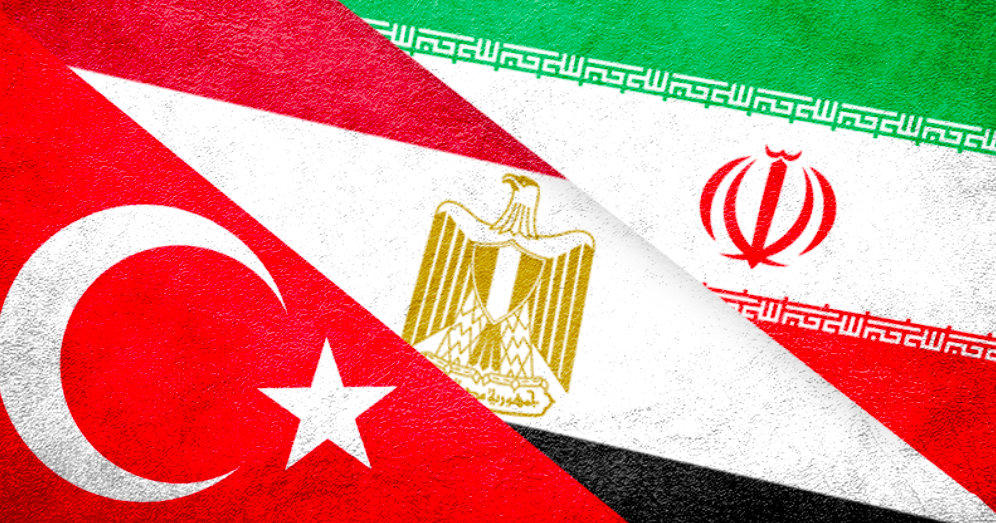
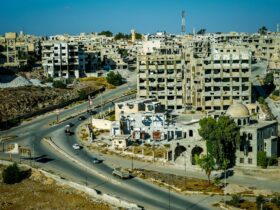


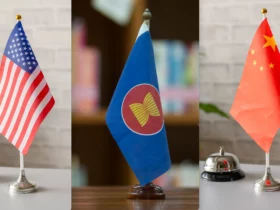
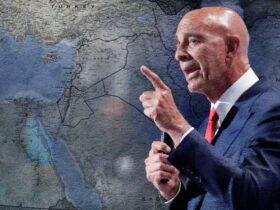

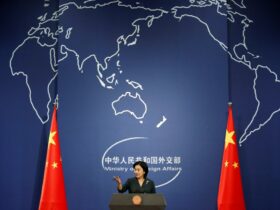
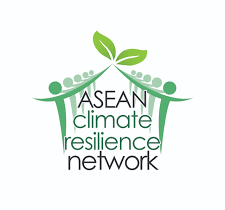

Leave a Reply